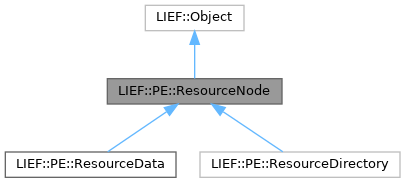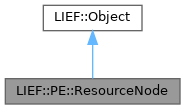Class which represents a Node in the resource tree. More...
#include <ResourceNode.hpp>


Public Types | |
| enum class | TYPE { UNKNOWN = 0 , DATA , DIRECTORY } |
| Enum that identifies the type of a node in the resource tree. More... | |
| using | childs_t = std::vector<std::unique_ptr<ResourceNode>> |
| using | it_childs = ref_iterator<childs_t&, ResourceNode*> |
| using | it_const_childs = const_ref_iterator<const childs_t&, ResourceNode*> |
| Public Types inherited from LIEF::Object | |
| template<class T> | |
| using | output_t = add_pointer_t<decay_t<T>> |
| template<class T> | |
| using | output_const_t = add_pointer_t<add_const_t<decay_t<T>>> |
Public Member Functions | |
| ResourceNode (const ResourceNode &other) | |
| ResourceNode & | operator= (const ResourceNode &other) |
| ResourceNode (ResourceNode &&other)=default | |
| ResourceNode & | operator= (ResourceNode &&other)=default |
| void | swap (ResourceNode &other) |
| ~ResourceNode () override | |
| virtual std::unique_ptr< ResourceNode > | clone () const =0 |
| uint32_t | id () const |
| Integer that identifies the Type, Name, or Language ID of the entry depending on its depth in the tree. | |
| const std::u16string & | name () const |
| Name of the entry (if any). | |
| std::string | utf8_name () const |
| UTF-8 representation of the name(). | |
| it_childs | childs () |
| Iterator on node's children. | |
| it_const_childs | childs () const |
| bool | has_name () const |
| True if the entry uses a name as ID | |
| uint32_t | depth () const |
| Current depth of the Node in the resource tree. | |
| bool | is_directory () const |
| True if the current entry is a ResourceDirectory. | |
| bool | is_data () const |
| True if the current entry is a ResourceData. | |
| void | id (uint32_t id) |
| void | name (const std::string &name) |
| void | name (std::u16string name) |
| ResourceNode & | add_child (std::unique_ptr< ResourceNode > child) |
| Add a new child to the current node, taking the ownership of the provided unique_ptr. | |
| ResourceNode & | add_child (const ResourceNode &child) |
| Add a new child to the current node. | |
| void | delete_child (uint32_t id) |
| Delete the node with the given id. | |
| void | delete_child (const ResourceNode &node) |
| Delete the given node from the node's children. | |
| void | accept (Visitor &visitor) const override |
| template<class T> | |
| const T * | cast () const |
| template<class T> | |
| T * | cast () |
| std::string | to_string () const |
| void | push_child (std::unique_ptr< ResourceNode > node) |
| Public Member Functions inherited from LIEF::Object | |
| Object () | |
| Object (const Object &other) | |
| Object & | operator= (const Object &other) |
| Object (Object &&other) noexcept=default | |
| Object & | operator= (Object &&other) noexcept=default |
| template<class T> | |
| output_t< T > | as () |
| template<class T> | |
| output_const_t< T > | as () const |
| virtual bool | operator== (const Object &other) const |
| virtual bool | operator!= (const Object &other) const |
| virtual | ~Object () |
Static Public Member Functions | |
| static std::unique_ptr< ResourceNode > | parse (BinaryStream &stream, uint64_t rva) |
| Parse the resource tree from the provided BinaryStream stream and with the original RVA provided in the second parameter. | |
| static std::unique_ptr< ResourceNode > | parse (const uint8_t *buffer, size_t size, uint64_t rva) |
| Parse the resource tree from the provided buffer referenced by a pointer and the size. The second parameter is the RVA where the resource is (or was) located. | |
| static std::unique_ptr< ResourceNode > | parse (const std::vector< uint8_t > &buffer, uint64_t rva) |
| See doc from other parse functions. | |
| static std::unique_ptr< ResourceNode > | parse (span< const uint8_t > buffer, uint64_t rva) |
| See doc from other parse functions. | |
| static std::unique_ptr< ResourceNode > | parse (BinaryStream &stream, const Binary &bin) |
Detailed Description
Class which represents a Node in the resource tree.
Member Typedef Documentation
◆ childs_t
| using LIEF::PE::ResourceNode::childs_t = std::vector<std::unique_ptr<ResourceNode>> |
◆ it_childs
◆ it_const_childs
| using LIEF::PE::ResourceNode::it_const_childs = const_ref_iterator<const childs_t&, ResourceNode*> |
Member Enumeration Documentation
◆ TYPE
|
strong |
Constructor & Destructor Documentation
◆ ResourceNode() [1/2]
| LIEF::PE::ResourceNode::ResourceNode | ( | const ResourceNode & | other | ) |
References ResourceNode().
Referenced by add_child(), add_child(), cast(), LIEF::PE::ResourceData::classof(), LIEF::PE::ResourceDirectory::classof(), delete_child(), operator!=, operator<<, operator=(), operator=(), operator==, LIEF::PE::ResourceData::ResourceData(), LIEF::PE::ResourceData::ResourceData(), LIEF::PE::ResourceData::ResourceData(), LIEF::PE::ResourceDirectory::ResourceDirectory(), LIEF::PE::ResourceDirectory::ResourceDirectory(), ResourceNode(), ResourceNode(), and swap().
◆ ResourceNode() [2/2]
|
default |
References ResourceNode().
◆ ~ResourceNode()
|
override |
Member Function Documentation
◆ accept()
|
overridevirtual |
Implements LIEF::Object.
◆ add_child() [1/2]
|
inline |
Add a new child to the current node.
References add_child(), clone(), and ResourceNode().
◆ add_child() [2/2]
| ResourceNode & LIEF::PE::ResourceNode::add_child | ( | std::unique_ptr< ResourceNode > | child | ) |
Add a new child to the current node, taking the ownership of the provided unique_ptr.
References ResourceNode().
Referenced by add_child().
◆ cast() [1/2]
|
inline |
References ResourceNode(), and LIEF::PE::T.
◆ cast() [2/2]
|
inline |
References LIEF::PE::T.
◆ childs() [1/2]
|
inline |
Iterator on node's children.
◆ childs() [2/2]
|
inline |
◆ clone()
|
pure virtual |
Implemented in LIEF::PE::ResourceData, and LIEF::PE::ResourceDirectory.
Referenced by add_child().
◆ delete_child() [1/2]
| void LIEF::PE::ResourceNode::delete_child | ( | const ResourceNode & | node | ) |
Delete the given node from the node's children.
References ResourceNode().
◆ delete_child() [2/2]
| void LIEF::PE::ResourceNode::delete_child | ( | uint32_t | id | ) |
Delete the node with the given id.
◆ depth()
|
inline |
Current depth of the Node in the resource tree.
◆ has_name()
|
inline |
True if the entry uses a name as ID
References id().
◆ id() [1/2]
|
inline |
Integer that identifies the Type, Name, or Language ID of the entry depending on its depth in the tree.
Referenced by has_name(), and id().
◆ id() [2/2]
|
inline |
References id().
◆ is_data()
|
inline |
True if the current entry is a ResourceData.
It can be safely casted with:
References DATA.
Referenced by LIEF::PE::ResourceData::classof().
◆ is_directory()
|
inline |
True if the current entry is a ResourceDirectory.
It can be safely casted with:
References DIRECTORY.
Referenced by LIEF::PE::ResourceDirectory::classof().
◆ name() [1/3]
|
inline |
◆ name() [2/3]
| void LIEF::PE::ResourceNode::name | ( | const std::string & | name | ) |
References name().
◆ name() [3/3]
|
inline |
References name().
◆ operator=() [1/2]
| ResourceNode & LIEF::PE::ResourceNode::operator= | ( | const ResourceNode & | other | ) |
References ResourceNode().
◆ operator=() [2/2]
|
default |
References ResourceNode().
◆ parse() [1/5]
|
static |
◆ parse() [2/5]
|
static |
Parse the resource tree from the provided BinaryStream stream and with the original RVA provided in the second parameter.
The RVA value should be come from the DataDirectory::RVA associated with the resource tree.
◆ parse() [3/5]
|
inlinestatic |
See doc from other parse functions.
References parse().
◆ parse() [4/5]
|
static |
Parse the resource tree from the provided buffer referenced by a pointer and the size. The second parameter is the RVA where the resource is (or was) located.
◆ parse() [5/5]
|
inlinestatic |
See doc from other parse functions.
References parse().
◆ push_child()
|
inline |
References LIEF_LOCAL.
◆ swap()
| void LIEF::PE::ResourceNode::swap | ( | ResourceNode & | other | ) |
References ResourceNode().
◆ to_string()
|
inline |
◆ utf8_name()
| std::string LIEF::PE::ResourceNode::utf8_name | ( | ) | const |
UTF-8 representation of the name().
The documentation for this class was generated from the following file:
Generated by